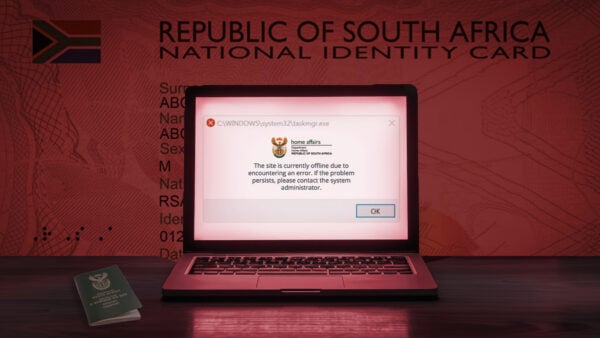Police fraud warning in South Africa

The Southern African Fraud Prevention Service (SAFPS) has issued a warning about a scam in which fraudsters pose as members of the South African Police Service (SAPS).
The organisation said these scammers imitate police officials to trick and intimidate individuals into handing over personal and financial information.
“In extreme cases, victims are even manipulated into transferring funds to these scammers,” the SAFPS warned.
Notably, the organisation warned that even the most vigilant South Africans could fall victim to these fraudsters, who go to great lengths to carry out elaborate schemes.
In these scammers’ case, the method of deception involves a “sophisticated blending of impersonation, social engineering and cyber scams”.
They will contact victims through telephone calls and sometimes video calls, claiming to be police officers from a regional SAPS station or a specialised unit.
The scammer informs the victim that their personal details, including ID numbers, passport numbers, or bank accounts, have been linked to suspicious activities.
These activities may include airline ticket purchases, package deliveries, transactions related to human or drug trafficking, or other illicit activities.
“Under the guise of investigating whether the victim is a suspect or an unwitting participant, the scammer creates a heightened sense of fear and urgency,” the SAFPS explained.
“They falsely claim that the individual has been flagged as a possible perpetrator and must prove their innocence immediately, or they will be apprehended and jailed as they pose a security risk.”
To further deceive victims and establish credibility, scammers will send fake documents, such as arrest warrants or search and seizure warrants, complete with official SAPS and government logos.
These documents may contain legal jargon and formatting that resembles authentic government paperwork, designed to deceive individuals unfamiliar with legal or police procedures and documentation.
“To further legitimise the deception, victims are often transferred to a second or third superior or specialist officer or department, reinforcing the illusion of a coordinated investigation,” SAFPS’ head of product development, Nazia Karrim, explained.
“These fake officers speak in formal and intimidating tones, instilling fear while pretending to guide the victim through a process to assist them in proving their innocence.”
The next phase usually involves instructions on how to communicate via WhatsApp. The scammers tell the victim not to contact their local police station or anyone else, claiming the matter is sensitive or involves corrupt police officials.
“Victims are then directed to participate in a video call to allegedly give a statement attesting to their innocence,” Karrim explained.
“During the call, which the scammer insists must be private, they continue to issue threats and pressure the individual to comply.”
Sophisticated scams

Karrim said these scammers often refuse to show their faces on video calls, citing various reasons, including concerns about legality and security risks.
The scammers then manipulate victims into sharing highly sensitive information, banking details, ID numbers, lists of assets, and even screenshots of accounts and bank statements.
Eventually, the scammers instruct the victim to transfer funds into a fictitious account, claiming it belongs to the South African Reserve Bank for safekeeping during the investigation.
In other cases, victims are sent a link to install a fake SAPS mobile application containing malware. “Some victims have even reported downloading it from trusted app stores,” she warned.
“Once installed and granted permissions, the app gives scammers remote access to the victim’s phone and data.”
This enables the scammers to monitor calls, access all messages, emails, and applications, conduct financial transactions, and have the victim biometrically authenticate them on the call.
“This scam is deeply traumatic for victims, combining psychological manipulation, fear tactics, and compelling visuals,” Karrim said.
“In some cases, scammers even register their numbers with call ID services like TrueCaller under legitimate-sounding police station names, making the call appear authentic.”
“These calls can be as short as a 20-minute discussion to well over an hour, with scammers refusing to end the call until they have defrauded the victim.”
How to protect yourself

The SAFPS urged the public to be aware of the following to avoid falling victim to these scams.
- Official police investigations are never carried out via WhatsApp or any messaging app. The SAPS does not use chat platforms to take statements, issue documentation, or make arrests.
- Law enforcement does not conduct investigations via video calls. If someone claiming to be a police officer insists on a video call to take a statement, it is a significant warning sign.
- You have the right to ask for the officer’s identification and to verify their credentials. Always contact your nearest police station directly to confirm their identity and understand the procedures for interviews with suspects or victims.
- The SAPS will not send legal documents through chat apps or social media. All official documents are delivered in person and through appropriate legal channels.
- Law enforcement officials cannot prevent you from contacting your lawyer or a third party. If someone attempts to do so, they are likely trying to manipulate or intimidate you.
- You cannot be compelled to travel to a police station outside of your province. Genuine investigations can occur at your local station, where an assigned officer will assist you.
- No police officer will ever ask you to transfer funds or share screenshots of your banking app or bank statements during a video call or through a chat service. The SAPS, the Reserve Bank, or any other government agency will never request money to verify your innocence or safeguard your assets, regardless of the type of investigation.
“Hang up immediately if something feels off; following that, contact the police station for assistance if necessary,” Karrim urged. “Warn the community, especially the elderly or vulnerable, about this scam.”
“Finally, by staying informed and vigilant, you can protect yourself and others from falling victim to these sophisticated and emotionally distressing scams.”
This article was first published by Daily Investor and is reproduced with permission.
































